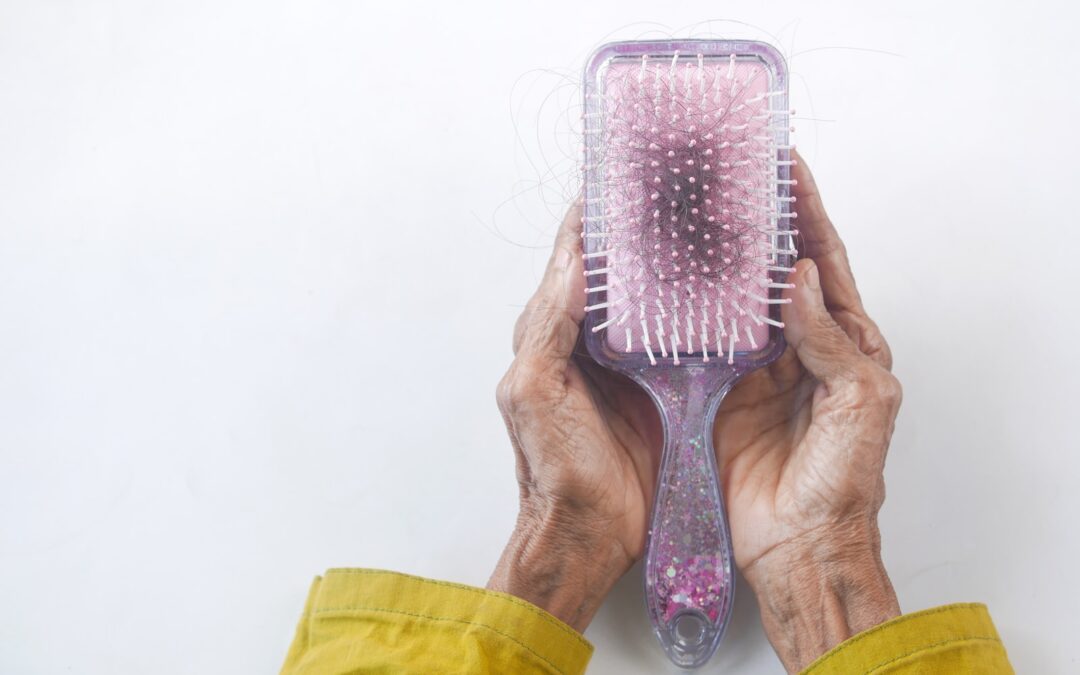Have you been noticing an increasing amount of hair loss, or maybe a balding patch on your scalp that wasn’t obvious before? Maybe the people sharing your bathroom have been complaining about the clumps of hair in the drain?
When you type “types of hair loss” in the google search bar, you will see there are at least 8 different categories listed! That’s a lot of possibilities for the thinning pony tail.
Hair begins its journey as keratin cells (a type of protein) just below the surface of the skin, in the hair follicles. Here in the follicles, the keratin cells which become hair are given nourishment by blood supply to help it grow. As new keratin cells are produced in the follicles, the dead keratin cells are pushed through the surface of the skin and result in the hair you can see. Yep, your hair is dead protein!
There are 3 growing phases in the hair life cycle. These include active hair growth (2 to 7 years); transitional growth (2 to 3 weeks); and the resting phase which lasts about 3 months. At the end of the resting phase, the hair falls out and a new hair replaces it, starting the cycle again.
It’s said to be normal to lose about 100 hairs per day. So a few stray hairs on your shoulder or on the floor are no cause for alarm. Also, longer hair tends to collect more easily than short hair, so it can appear more visually dramatic than it really is.
Though hair loss is not life-threatening, it can lead to emotional stress and may be a sign of other underlying issues in the body.

How Do You Know If You Are Losing Too Much Hair?
These signs may warrant a mention to your health care provider:
- Your hair is becoming obviously thinner in a short space of time.
- There are visible balding patches on your scalp or body.
- There is soreness, redness or scarring on your scalp.
- You are having to roll large clumps of hair out of your hands every time you run your hands through or wash your hair.
- Your hair is breaking easily and very brittle, leaving behind short strands with broken tips.
What Are The Possible Causes Of Hair Loss?
Alopecia is the technical term for hair loss and can occur for many and varied reasons. Some may include:
- Old age…hair growth slows as we get older.
- Emotional stress or trauma.
- Hormonal imbalances or changes. This can occur for men and women.
- Thyroid disease – thyroid hormones are thought to play a role in hair follicle health.
- Long periods of dieting.
- Nutritional deficiencies- for example iron, zinc, vitamin D, niacin, protein, selenium, biotin, silica and iodine deficiency are known to contribute to hair loss.
- Autoimmune diseases such as lupus, lichen planus, alopecia areata, hashimotos – conditions where the immune system becomes confused and attacks the body’s own healthy cells.
- Psychological disorders in which a person pulls out their own hair.
- Scarring or inflammatory conditions of the scalp such as eczema, psoriasis, folliculitis.
- Some medications- for example chemotherapy drugs, acne medications, immune suppressants, and others. Check with your pharmacist if unsure.
- Excessive styling.
What Should You Do If You Suspect You Are Losing Too Much Hair?
If you suspect your hair loss is more than what is considered normal, you should talk to your health practitioner and hairdresser.
The health of your hair and scalp can tell the practitioner a lot about what is going on in your body and what should be checked out. Depending on the outcomes of a wholistic assessment, there are many options for treatment including, dietary changes and lifestyle management. Sometimes a little extra assistance may be needed from the inside out, depending on the root causes of your hair loss. There are many natural options available, but it should NOT be a one-size-fits-all approach.
If you’re keen to do a little hair pampering session at home, take a look at these Low tox home remedies for healthy hair.
Some herbal remedies for healthy hair include:
- Rosemary tea
- Gotu kola
- Gingko biloba
- Horsetail herb
- Bladderwrack
- Nettle leaf





